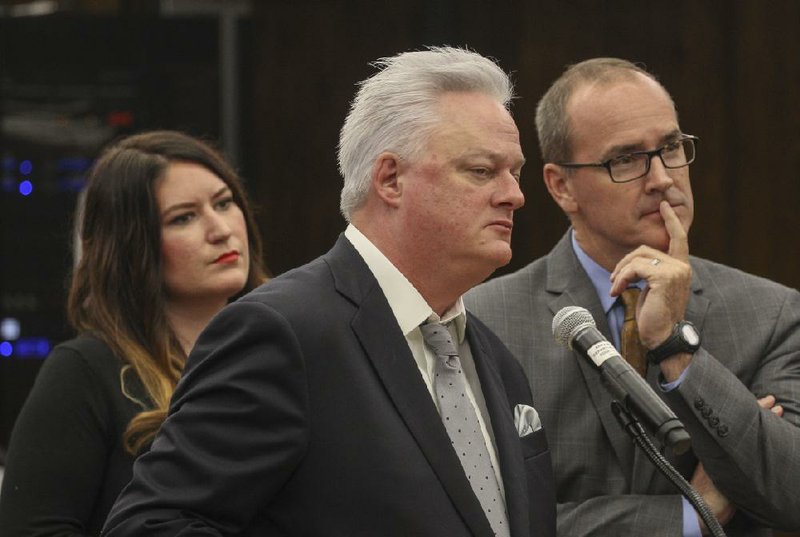The Charter Authorizing Panel on Wednesday endorsed the addition of up to 900 charter-school seats in Rogers and gave the green light to the state's first adult-education charter school.
With the panel's blessing, Haas Hall Academy will open its fourth campus by fall 2017 in downtown Rogers' historic Lane Hotel, accommodating up to 500 students, and Arkansas Arts Academy -- a third of a mile away -- will add up to 400 more students to its campus. The Excel Center in Little Rock, sponsored by Goodwill Industries of Arkansas Inc., will open the state's first charter school geared for adults ages 19 and up to earn a high school diploma, thanks to Act 1200 of 2015.
The group also gave the OK for KIPP Delta Public Schools to move its elementary school from its location on Cherry Street in Helena-West Helena some 5 miles down the road to the site of the former Beech Crest Elementary. KIPP bought the elementary school for $50,000 from the Helena-West Helena School District and wants to reconfigure its downtown campus.
All of the decisions made by the panel -- which is made up of top state Department of Education officials -- are subject to review by the Arkansas Board of Education, which can either uphold the panel's decisions or make its own decision after a hearing.
Statewide, open-enrollment charter schools and systems had 12,406, of 2.6 percent, of the 476,000 students enrolled in public school systems last year, according to Education Department data. Nearly 11,500 more student were enrolled in district-conversion charter schools.
Many open-enrollment charter schools have asked to expand because of increasing demand, and the state has mostly allowed the expansions.
For Haas Hall, approval to expand came after much discussion about the school's mission and student diversity. All of the panel members except one -- Eric Saunders, the department's assistant commissioner of fiscal and administrative services -- voted for the charter school to expand.
"I've had concerns over the lottery process not producing a diverse population that we mentioned, I think, at the previous hearing," Saunders said, adding that he hoped the new location would improve student-body diversity.
Haas Hall Academy's Fayetteville campus opened in 2004 and has earned state and national accolades -- including being ranked the No. 1 school in the state by U.S. News & World Report. A second campus in Bentonville, which opened in 2015, has its own charter.
This summer, the state Education Board paved the way for a Haas Hall campus in Springdale. That campus and the latest in Rogers are a part of the Fayetteville charter and are set to open in August with enrollment caps of 500 students each. The Fayetteville campus also is increasing the number of students.
All campuses serve seventh- through 12th-graders. Each campus will grow incrementally, founder and superintendent Martin Schoppmeyer said, adding that Fayetteville is at capacity and that he is hoping to add 60 more students to the Bentonville campus next year.
Stacy Smith, the department's assistant commissioner for learning services, said she had a "personal concern" that the school's mission attracted mostly academically successful students.
"I've been struggling here lately, and I think it's been around the mission of the school," Smith said. "I think the problem that I think people have -- this is what I'm trying to decide is: is this really a problem, or is this really what charters are? -- you get to say, 'We're No. 1 ... Our students have the highest scores,' and then we say, 'But you only take the highest students.' That's your mission. You're not doing anything you're not saying you're doing. So, then when we push back and ask questions about diversity and socioeconomics ... is it fair of us? Is it not fair of us?"
She added that she was challenging the panel to ask: Why is it OK for one charter school to focus on dropouts and another charter school to focus on the highest-achieving students?
School officials said they have had students who were not successful in the traditional public school setting but have excelled at Haas Hall.
The college-preparatory academy submitted a letter from Rogers Mayor Greg Hines, who said the area in which the campus would be "contains the most populated mix of multicultural, multiethnic residents that are in the lower socioeconomic status in Rogers."
The Rogers campus will have a commercial kitchen, which school officials said will allow campuses to participate in the federal school lunch program for the first time, Schoppmeyer said.
Heather Holaway, the school's executive director of marketing, said the school was doing "anything and everything" to increase its visibility. The school has a partnership with the Cisneros Center for New Americans -- an immigrant resource center with three offices, including one in Springdale -- and is trying to increase its community outreach through the Latino Heritage Festival and the Salsa Festival, school officials said.
Holaway presented for the panel a new lottery system, in which students fill out one application for all of the campuses and are assigned a different random number, or a lottery identification number, for each campus. The application and a tracking number is available online at any time, but families without Internet access can complete the application on site and get a printed paper with all lottery information on it. A Haas Hall employee also can help families set up an email account to track the status of the student's application.
The system follows all the guidelines in a best-practices webinar, she said, adding the Education Board praised it for being easy and transparent. The school also started a program that allows prospective students to get a feel for the school.
"They come to the school," Holaway said. "They attend a full day of classes. They'll eat lunch with the kids. They'll go to PE. It's a full day of actually attending class at the school, and it's really neat. It gives the kids a perspective that otherwise they'd have to wait until they're actually enrolled to get."
This year, Haas Hall is adding information sessions for the entire family to tour, meet faculty members and learn about the admissions process.
Panel members acknowledged that school officials have listened and worked to allay their concerns. The panel has asked the preparatory school to collaborate with neighboring school districts, something it is currently working on.
"I listen to what they want me to do," Schoppmeyer said. "They're wanting students to be successful, and I'm wanting students to be successful. And I want to be a part of the success."
For the Arkansas Arts Academy, increasing its enrollment cap by 400 will help expand its course offerings "to be the best arts school in the nation," CEO Mary Ley said. The school serves kindergarten through 12th grade and expects to see most of its growth at the high school level.
"We want the 400 because we are getting ready to rebuild the high school, and also, when we rebuild the high school, we will have to have the additional 400 students to help sustain it as years come," she said. "Our current facility is 52,000 square feet for the high school, and you'd think that's a lot of square feet, but a lot of that is that performing arts center. So we'd be asking for another 27,462 feet, which is all state-of-art art labs."
The school also is planning for incremental enrollment increases, Ley said.
"We want it to be gradual up to 2021," she said. "So we're not asking for it all at once because they would build the art labs, and then we would add a few more kids, and build another lab for academics. And so it will take a while for all this space to be available for all these students."
Nathalie Brunell, the chief financial officer for the school, said administrators would add programs as the funding is there.
The school currently has a bond issue, which it plans to refinance for "quite a bit of savings," she said. The arts academy also is receiving a non-interest bearing loan from a donor with deferred repayment, meaning the school would repay it if its cash flow is sufficient, she said, adding it would need another bond issue. Its current debt service payment is about $600,000, she said.
The academy also has added bus transportation for the first time and likely will add two more buses. It will start its first marketing campaign to help draw more students.
A third charter school approved Wednesday will add some 125 adult students looking to earn a high school diploma in Pulaski County. Called the Excel Center, the school is backed by Goodwill Industries of Arkansas Inc. and plans to open at 7400 Scott Hamilton Drive in July 2017.
Other Goodwill locations have similar adult-education charter schools in Texas, Tennessee, Indiana and Washington, D.C., that are funded through operations and donation sales. Arkansas legislators passed a law last year that allowed these schools to operate in state.
"Our mission simply is that we change lives through education, training and employment," said Brian Itzkowitz, the president and CEO of Goodwill Arkansas. "This is going to be a game changer for Arkansans."
Stacey Hunter Schwartz, director of education and certification programs at Goodwill Arkansas, said about 18 percent of Arkansans don't have high school diplomas. In Pulaski County alone, she estimated 24,000 adults don't have high school diplomas.
That many Arkansans are not ready to enter the workforce, and children of high school dropouts are more likely not to finish school themselves, she said.
"The high school diploma is something that employers really do want," said Kim Reier, Goodwill Education Initiative's director of network development. "Employers really see a high school diploma as more valuable than a GED."
The centers, which started in fall 2011 in Indiana, have had more than 2,300 graduates earning more than 2,500 postsecondary credentials, such as a technical certificate or a higher-education degree.
The new charter school will have a year-round schedule with five eight-week terms. Classes are flexible, offered at most times of the day and many in classrooms. The school also will offer free child care and transportation assistance.
Students will be assigned a "life coach" to help with academics and barriers of success outside of school. The life coaches will help them plan for what's next as students get closer to graduation.
The panel members wished the charter school success, calling it a good opportunity.
"This would be the kind of thing that makes me passionate about the work that we do here at the department," Smith said. "This is what I think really charters are supposed to be about is identifying a need, thinking innovatively and then us, as the Charter Authorizing Panel, not getting in the way but finding ways to make it happen. I am honored just to vote and be a part of this today."
A Section on 10/20/2016

